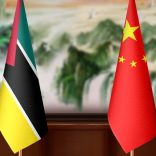Mozambique central bank cuts key rate to 9.75% – Watch
Inflation remains on target in Mozambique, says FinMin

In file Club of Mozambique
The Minister of Economy and Finance, Adriano Maleiane, said yesterday in Maputo that, despite the current exchange rate instability and price increases, inflation would remain within the five percent target set by the government this year.
Speaking to journalists, Maleiane said that from his ministry’s perspective, the government programmes presented in the Economic Social Plan (PES) and the State Budget for 2015 are being implemented.
Some adjustments are being made as a result of the impacts that the country is facing due to the approach of the festive season, with the commercial banks and the Central Bank working together to ensure that there are no basic necessity supply problems.
“While we work for the future in this Christmas and end-of-year period, things cannot get worse because of the shock which, being International in nature, has much more burdensome consequences for us, because, unfortunately, we continue to have an economy that imports more than it exports and consumes more than it produces,” said Maleiane.
He warned that if the country does not reverse this situation it risks remaining be a mere pawn of what is happening in other countries, noting however that exchange rates are now a global problem that affects even developed countries, with their greater ability to mobilize reserves.
Continuing to explain the reasons for his optimism on inflation indicators, Maleiane stressed that the latest data show October inflation was 2.4 per cent, higher than in previous months but within the five percent margin set for 2015.
Asked about the loan from the International Monetary Fund which is to approved within days, Maleiane explained that it results from an assessment by the IMF itself, along with the Mozambican government, based on the country’s macroeconomic indicators, and especially the GDP and the exchange rate.
According to the minister, the IMF believes that Mozambique cannot achieve the 7.3 percent GDP growth initially projected for 2015 and later revised down to 7 percent, and can only grow by around 6.3 percent.
“The IMF’s task is to help member states align their exchange rates, and in our case it turned out that we had a depreciation of the metical of the order of 40 percent, so the IMF advised the country to use the various tools available to address this, and that’s why the US$ 286 million is being granted,” he said.
The minister said that access to the funding was a natural process and without the many structural adjustment preconditions usually imposed on IMF aid recipients. The loan is however accompanied by stringent verification requirements on how it will be used and other measures commonly provided for in IMF programmes.












Leave a Reply
Be the First to Comment!
You must be logged in to post a comment.
You must be logged in to post a comment.